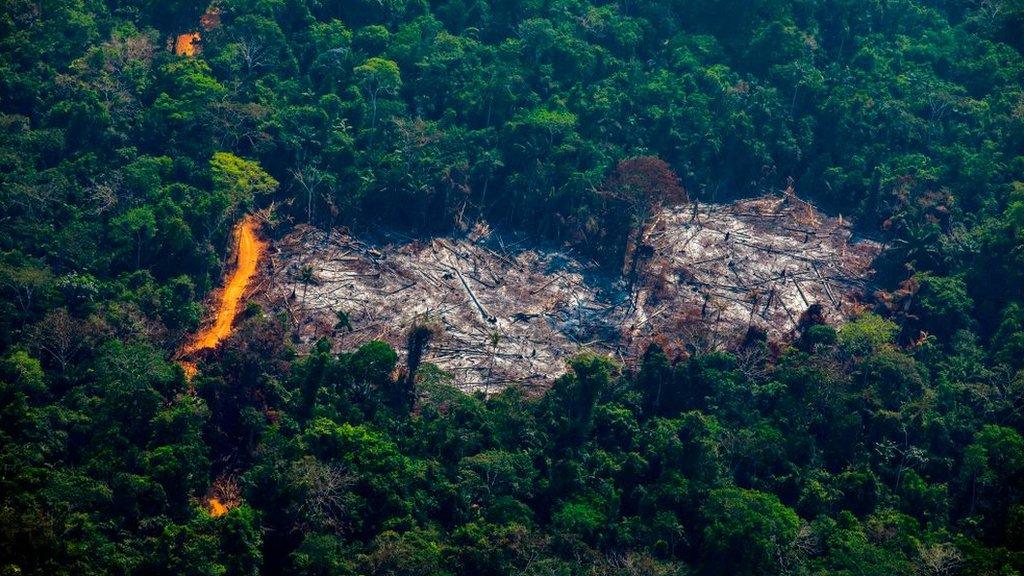Climate change: Emissions gap report shows countries are not cutting emissions quickly enough
- Published
- comments

Wildfire in the Amazon rainforest have been made worse by climate change
The annual emissions report by the United Nations has just been released, and the results show countries aren't doing enough to cut global emissions.
The report has shown that even if all the countries follow through with the promises they made to cut emissions, the world could still warm by 3.2 degrees by the end of the century.
Global climate change experts at the Intergovernmental Panel on Climate Change (IPCC) warned that allowing temperatures to rise more than 1.5 degrees this century would have hugely damaging effects for human, plant and animal life across the planet.
Some of the wealthiest countries have been criticised for not pulling their weight, with 15 out of 20 nations having no timeline for a net zero target, and the report says emissions have gone up by 1.5% per year in the last decade.
The emissions gap report looks at the difference between what scientists recommend we should be doing to combat global warming, vs what we actually are doing, and how much of a gap there is between them.
Coral is at risk from climate change
What would this mean for the world?
An increase of 3.2 degrees might not sound like much, but small changes can have massive impact.
According to experts, coral reefs would be wiped out with a 2°C increase in temperature.
The Arctic and Antarctic ice caps would melt causing global sea-levels to rise to round 10-60cms, which would increase the risk of flooding for millions of people and wildlife around the world.
The ability to grow certain crops like rice and wheat could also become more difficult.
Extreme weather like heatwaves, droughts and storms could happen more often and become more severe.
Our...failure to act early and hard on climate change means we now must deliver deep cuts to emissions - over 7% each year, if we break it down evenly over the next decade
World leaders gathered at the G20 summit in Japan
How are world leaders committing to fight climate change?
In 2015 a huge international deal took place, called the Paris Agreement.
Leaders from 195 countries came together to try to keep the world's temperature from increasing by two degrees by making pledges to lower emissions.
Earlier this year the UN Climate Action Summit took place, where world leaders, big businesses and climate activists like Greta Thunberg came together to make a positive commitment to cutting global emissions.
77 countries made a promise to cut greenhouse gasses to net zero by 2050 - including the UK.
What needs to be done?
The wildfires in Australia have been worsened by climate change
The G20 - the group of the world's 20 wealthiest countries, are responsible for 78% of all emissions.
But so far, only the EU, the UK, Italy and France have committed to long-term net zero targets.
Seven G20 members need to do more to achieve their current promises, including: Australia, Brazil, Canada, Japan, the Republic of Korea, South Africa and the US.
The UN has said that if these countries don't make bigger commitments and improvements to their plans, then the target of only increasing the global temperature by 1.5C will be missed by a significant amount.
What about the UK?
In 2019 the government announced a plan to cut greenhouse gas emissions to almost zero by 2050.
Britain was the first major nation to propose this target.
Theresa May who was prime minister at the time said there was a "moral duty to leave this world in a better condition than what we inherited".
The actual terminology used by the government is "net zero" greenhouse gases by 2050.
That means emissions from homes, transport, farming and industry will have to be avoided completely or - in the most difficult examples - offset by planting trees or sucking CO2 out of the atmosphere.
- Published2 July 2019
- Published1 December 2019
- Published30 August 2019
